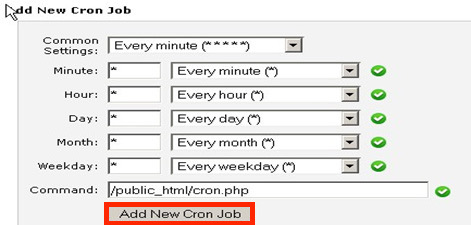

Or course the big difference is avoiding to download and then discard the document, index.html. The additional advantage is that the log output, and the document output, are not generated, instead of generated and discarded locally. This has the same advantages as wget -O /dev/null -o /dev/null. Your example command would be changed to this: */5 * * * * wget -q -spider
Wget cron job no output code#
The exit code tells us whether the request was successful or not: $ wget -q -spider ''įor a command in crontab, the fact that there is no output in both cases means you can use getting no output as an indication of errors again. We can use the option -q (quiet) to make wget not output details about what it does.Ĭombining that, wget will neither output anything to stderr, nor save a document. In this context, it just does what we want - access the URL with 'HEAD' instead of 'GET'. The syntax to use the method HEAD with wget is a little odd: we need to use the option -spider. Check if there is anything logged in /var/spool/mail/root. It will allways return the same result code as 'GET' would, by definition. If you do 'sudo crontab -e', the cron job will be added in root users crons. Using 'HEAD' does just what you need, it does not transfer the document in the first place.


When using 'GET' for this task, the document is downloaded and discarded locally. To access a document in a way that does everything except actually downloading the document, there is a special command 'HEAD'. In the HTTP protocol, the command 'GET' is used to download a document.
Wget cron job no output manual#
Cron jobs are important because they automate tasks that reduce manual operations to help with security, performance, and functionality for an administrator and all of the users of the server or website. A few examples include checking for updates, backups, or sending out reminder notifications. That you only need the response means the data that is downloaded into the local file index.html does not need to be downloaded in the first place. A cron job is an automated background task scheduled to happen at a specific time. The idea is not to discard the output in some way, but not create any output at all. That allows for solution with some additional advantages over those of Once the cron job has run, you might be able to look in this file and get a better idea of what transpired.You say you only need the "200 OK" response in a comment. Obviously, the user that owns this cron job must have permission to write that output file if the file already exists or must have permission to write the directory if the file does not exist. I'd also suggest writing a log file from your cron method so you can output values and, if you are clever, be sure which branches of your code are executing.ĮDIT: you might also alter your cron job, whichever method you choose, to route the output of the cron job into a file so you might have some clue about what went down: wget `` > /path/to/file.txtĮDIT: I think you can also route both stderr and stdout to the same file like so wget `` &> /path/to/file.txt If you execute your codeigniter app this way, you should be able to see the output and also the errors that might bubble up during its execution. Rather than using wget to fetch your file from a web server, you should execute the command directly from the command line by invoking PHP on your codeigniter's index.php file: php /path/to/your/project/html/index.php cron_jobs/cron_job_TEST I thought the point of the wget was that it would behave just as though you are visiting the URL. I have also tried the /web/cgi-bin/php5 $HOME/html/ methods without luck. The text file and table are written to properly.īut when the cron runs - there is no result to the text file or the database table.ĬONTROLLER/FUNTION 'cron_jobs/cron_job_TEST': // CRON_1įile_put_contents("test_cron_job.txt", "cron_job_TEST-> ".date('l jS \of F Y h:i:s A'). When I test this - by visiting the URL. I set the test to write to a text file - and also to write to a database table. The only thing that is weird with your output is the In time parameter which is in the vardump output true and in the console output false. Saving to: `index.php?%2Fcron_jobs%2Fcron_job_TEST' Can you post the entries of the database tables cronjob and cronmanager and please post your log file. There are no errors returned in the cron result: HTTP request sent, awaiting response. My cron job is triggering properly from a godaddy shared server: wget ``


 0 kommentar(er)
0 kommentar(er)
